The mezzanine floor of the Tampa Convention Center buzzes chaotically with rightwing chatter: conspiracy theories, grievance politics and Christian nationalism. Look in any direction and someone in front of you, washed in sharp studio lights, is drawing a crowd and creating content.
Ahead of me, Russell Brand sits on a white sofa, broadcasting live on the conservative video-streaming service Rumble – his guest is the “alt-right” influencer Jack Posobiec. To the left, along an alleyway lined with small broadcast booths, is the longtime Donald Trump adviser and self-proclaimed “dirty trickster” Roger Stone, who is holding court on a podcast. To the rear, on a large metal scaffold, is Steve Bannon’s War Room channel, busy cutting between live footage of a small protest outside the event and adverts for various Trump-aligned products.

The panorama serves as a realisation of one of Bannon’s notorious PR idioms: flooding the zone with shit. This is the Turning Point Student Action summit, an annual gathering targeted at gen Z conservatives, which draws thousands from across the US. It was a driving force in Trump’s success among younger male voters at the last election.
In the arena next to the mezzanine, a conveyor belt of Maga superstars walk out to deliver keynote speeches, accompanied by spitting-flame cannon, pounding dubstep, spinning lasers and strobe lights. Brand delivers a bizarre diatribe – part standup comedy, part evangelical sermon – about his newfound conversion to Christianity in a word salad of alliteration and non sequiturs. Unsurprisingly, he makes no mention of the multiple rape and sexual assault charges he faces in the UK (to which he has pleaded not guilty).
He is immediately followed by Tom Homan, Trump’s loudmouth border tsar, who is met with cries of “USA, USA!” as he refers to himself in the third person: “Tom Homan is running one of the biggest deportation operations this country has ever seen!” It is hard to keep up with this melange of fearmongering, severity and self-congratulation. It’s the epitome of Trump’s America.
My colleague Tom Silverstone and I came here as the first stop on a journey across southern Florida. Once the quintessential swing state, it is now solidly Republican – and home to some of the president’s vast sources of personal wealth, including his beach club, Mar-a-Lago. It is also one of the hubs of his mass‑deportation programme.
It seems no coincidence that the fast pace at Turning Point mirrors the first six months of Trump’s second term, which has lurched from scandal to extreme policy to blatant self-dealing at extraordinary speed – from the administration’s acceptance of a $400m luxury jet from the state of Qatar to his family’s creation of a private members’ club in Washington DC, charging $500,000 (£380,000) in annual fees.
The apex of these brazen efforts to monetise the presidency is Trump’s venture into the world of cryptocurrency. He lauched his $TRUMP memecoin three days before he was sworn into office. These digital currencies have little to no financial use and are prone to rapid market fluctuations. Analysts estimate that the president’s family has netted about $315m since the venture launched into this volatile and speculative market and hundreds of thousands of investors have lost out. The whole episode lends itself to the argument that Trump’s return to power marks the advent of a second gilded age, last seen in the US after the civil war, when the unprecedented dominance of industry and technology led to rampant corruption and pronounced inequality.
In May, some of the largest $TRUMP coin investors were invited to a dinner with the president at his Virginia golf course, then on a VIP tour of the White House, which some observers described as a blatant pay-to-play. The White House press secretary, Karoline Leavitt, has said that Trump abides by all conflict of interest laws “that are applicable to the president”.
No one at Turning Point seems particularly concerned about any of these apparent grifts, though. Anthony Watson, a contributor, stands in the merchandise area of the convention, where limited-edition gold Trump golf shoes are $500. He flicks away my questions about the Qatari jet with little thought.
“What’s wrong about accepting it?” he says, after I point out it might fall under the general definition of a bribe. “Well, what did they get in exchange? Until you know, it’s speculation.”
I track down Stone to ask how he thinks the founding fathers, who authored the foreign emoluments clause of the US constitution to block corruption and limit foreign influence, might view Trump’s move into memecoin. “I don’t think they could envisage cryptocurrency, period, or the technological age that we’re in,” he says, dodging the question.
Beyond sheer audacity, these money-making schemes also strike at a clear contradiction within the Maga movement and its America First agenda. While most remain anonymous, some of the largest investors in Trump’s memecoin have been revealed as foreign nationals, one with ties to the Chinese Communist party. How does that tally with America First?
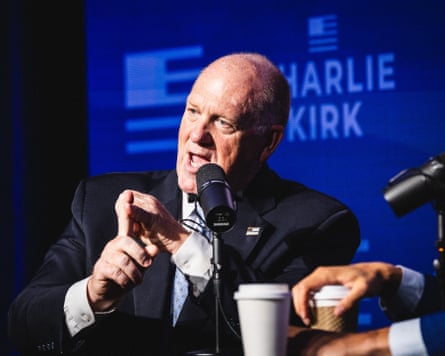
I address this question to Bannon, who greets me with a smile and professes his love of the Guardian, despite labelling us “fucking commies from England”.
He is willing to acknowledge a degree of unease, particularly when I mention the Chinese Communist party. But he still finds a way of reconciling it, arguing that the VIP event at the White House underscored a drive for “entrepreneurial capitalism”. “I’ve just got so much on my plate right now, I just don’t even focus on the memecoins,” he says, adding that “the crypto thing is not at that big a level”.
It seems to mark a turn for Bannon who, in 2019, described cryptocurrencies as having a “big future … in this global populist revolt” and – according to reporting by ABC News – partly took control of an anti-Joe-Biden memecoin in 2021, along with the Republican strategist Boris Epshteyn. He seems uneasy when I ask about this venture, named $FJB (officially Freedom Jobs Business, unofficially shorthand for Fuck Joe Biden), given allegations of missing funds, reported failures to donate promised money to charity and a potential examination by the US justice department (DoJ) in 2023.
“I think I put $500,000 into it,” Bannon recalls. Did he lose it all? “Yes. I think I lost all of it,” he says. He calls reports of a DoJ probe “fake news”.
We leave Turning Point shortly after Bannon’s keynote address, which includes a flurry of praise for the immigration crackdown and receives a large round of applause. “Mass deportations now. Amnesty never,” he says. We drive about four hours south of Tampa to the centre of the Everglades, where a single‑lane highway is surrounded by cypress trees and mangroves.
The administration’s immigration enforcement efforts are, in some ways, as brash and open as the Trump family’s presidential profit-making. Half a mile out, a large, newly installed bright-blue road sign announces we are approaching “Alligator Alcatraz”, a hastily constructed tent-like detention centre, surrounded by mosquito-infested swampland, about 50 miles outside Miami.
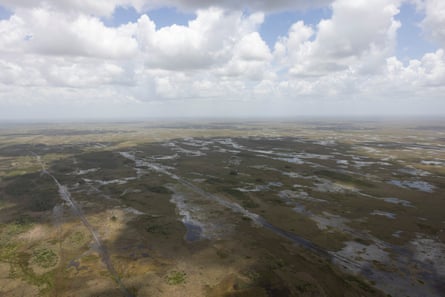
In a calculated display of draconian showmanship, Trump toured the facility in July, seeming to revel in its harsh conditions. It has become a symbol of this era of removals. Of the 57,000 people detained by Immigration and Customs Enforcement, more than 70% have no criminal record.
after newsletter promotion
This morning, a small congregation of protesters stand by the roadside looking on in dismay. “This place is shameful,” reads one sign.
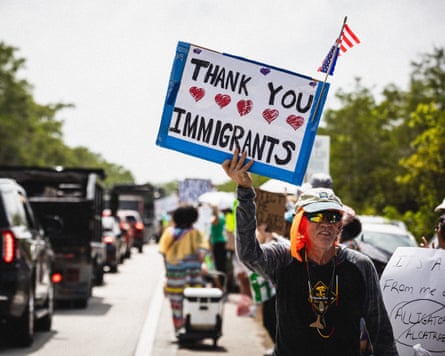
I explain where we have come from in Tampa and ask how they think the centre they are protesting against is connected to my conversations about Trump’s self-enrichment at the convention.
“It’s all part of the same thing,” says one older female protester. “For Trump, it’s about power and money. He’s doing everything he can to make money while he’s president. But he knows he has to be in power to maintain that, and this is all about power,” she says, gesturing towards the detention centre. “Power and fear.”
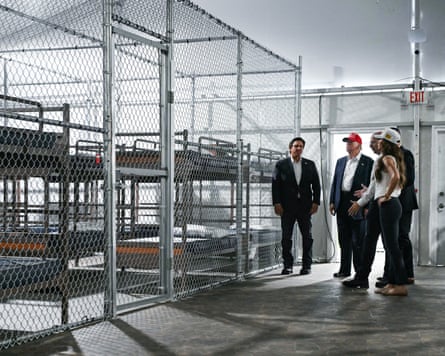
A few minutes later, a white SUV emerges from a roadway leading to the centre. The car pulls over to a grassy embankment and a family emerges. They had tried to gain access to a relative named Martin Sanchez. They were blocked from entering.
Sanchez, they tell me, has lived in the US without paperwork for the past 25 years, since coming from Mexico. He has two young children and no criminal record; he pays his taxes and works as a landscaper in the city of Palm Beach. He was arrested there four days earlier while on his way to work, mowing lawns.
“He calls me a lot,” says his cousin Janet Garcia. “He hasn’t showered. They treat him like a prisoner. He got caught for working and that’s it.”
She stares back towards the detention centre in the piercing sunlight. “Without immigrants, this country is gonna go down,” she says. “We have a felon in the White House, but the people they’ve got in here don’t even have a [traffic] ticket.”
There is something stark about the location of Martin’s arrest. Palm Beach county, on Florida’s eastern coast, is the location of some of the most pronounced and expanding income disparities in the state. Average house prices here exceed the median income by six times. Known as the “Wall Street of the south”, its corporation-tax-friendly climate has drawn many of the world’s biggest finance groups and it is home to at least 67 billionaires. The highest profile of these is, of course, Trump, whose Mar-a-Lago club is situated on a tree-lined street by the sea. A year ago, it raised its annual membership fees to $1m.
We drive to a food pantry a short distance from Trump’s club, where a line of about 20 people are waiting for the doors to open. A laminated sign on the wall warns that immigration officials will need a valid warrant to enter the premises and that the pantry, run by a local non-profit group, continues to serve people regardless of their legal status.
The county has a significant population of people from Haiti, many of whom are under threat of deportation after Trump moved to end their temporary immigration protections, despite the security crisis in the country. “Some of them are afraid to come,” says a volunteer minister. “It’s hard, you can imagine. You have no food, but, because of your immigration status, you stay home.”
The programme’s director, Ruth Mageria, shows me the large stockpiles of food in the fridges and tells me the pantry has seen a 71% increase in use over the past five years. Things are expected to get worse, as a spending bill passed by the Republican-controlled Congress and signed into law by Trump will cut basic food-assistance benefits for an estimated 22.3 million families across the country, while securing a host of tax cuts for the wealthy. The pantry has started preparing to ration its reserves.
With a thunderstorm rolling in over the Atlantic and dark clouds forming like a tidal wave on the horizon, we seek out Mar-a-Lago. We stand on a bridge, on the newly renamed President Donald J Trump Boulevard, and look out over billionaires row. I’m reminded that this community was founded during the US’s first gilded age.
It is an inauspicious end to this 400-mile journey across the state. The roads have emptied, but a small crew of landscapers, already drenched, are trimming the tall palms outside the club.
Oliver Laughland is the Guardian’s US southern bureau chief

 German (DE)
German (DE)  English (US)
English (US)  Spanish (ES)
Spanish (ES)  French (FR)
French (FR)  Hindi (IN)
Hindi (IN)  Italian (IT)
Italian (IT)  Russian (RU)
Russian (RU)  1 month ago
1 month ago







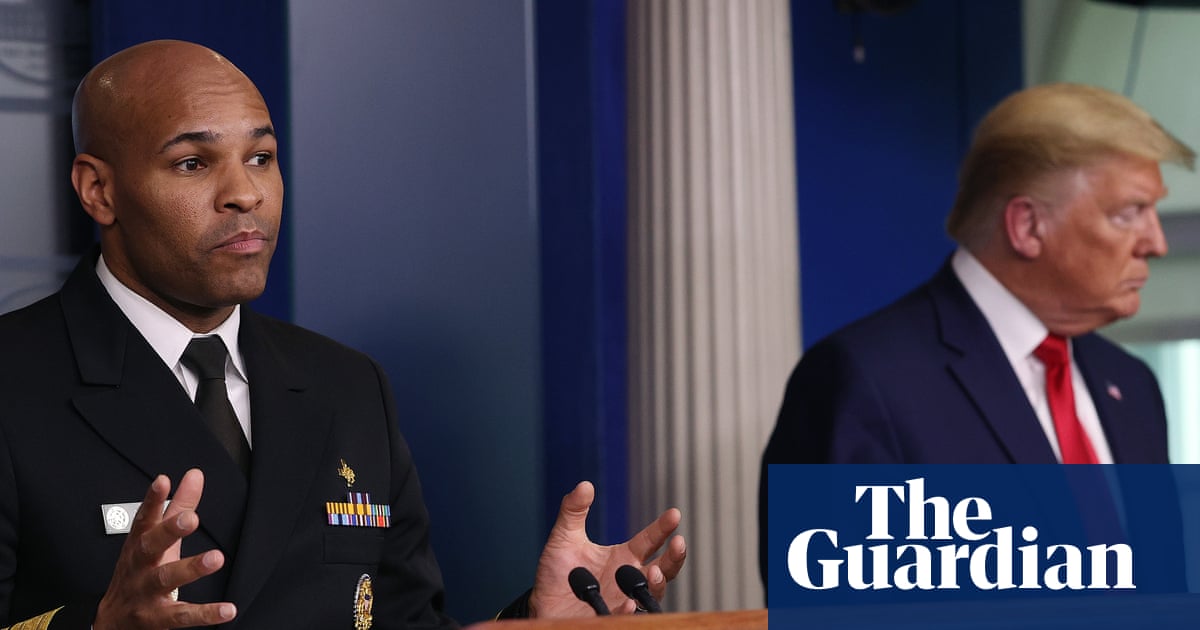


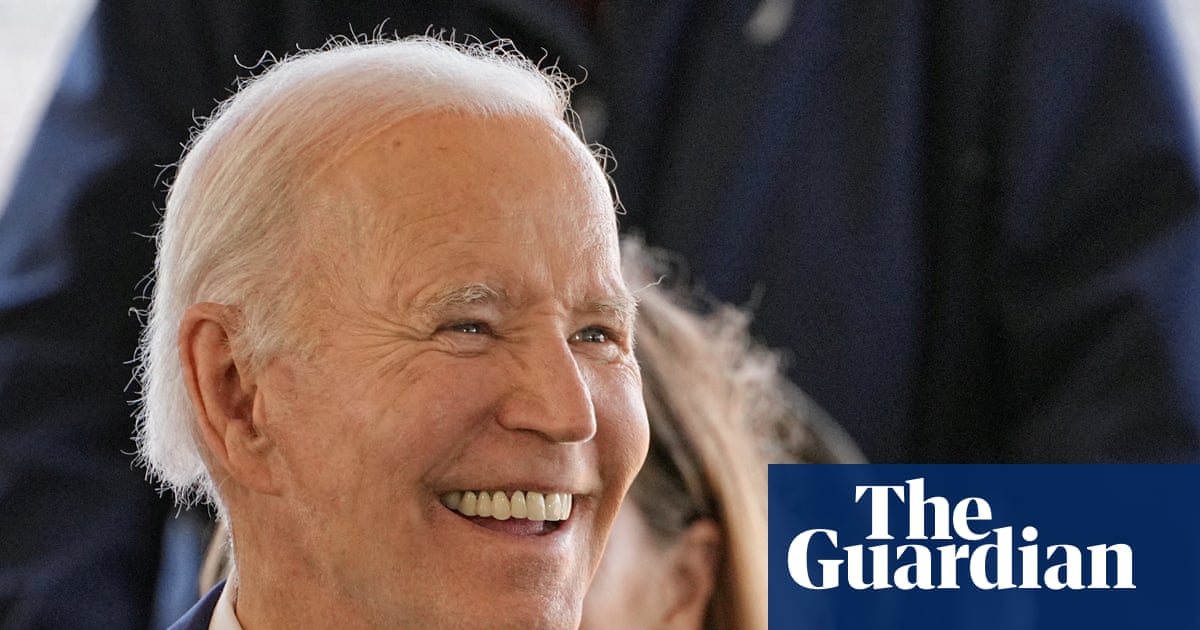


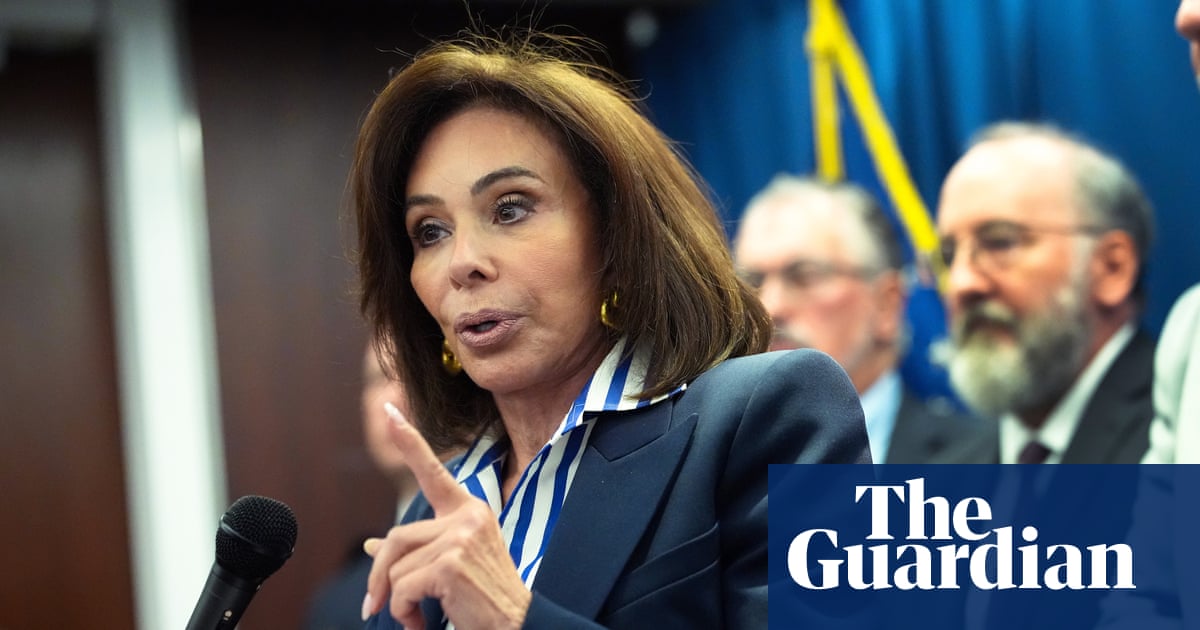



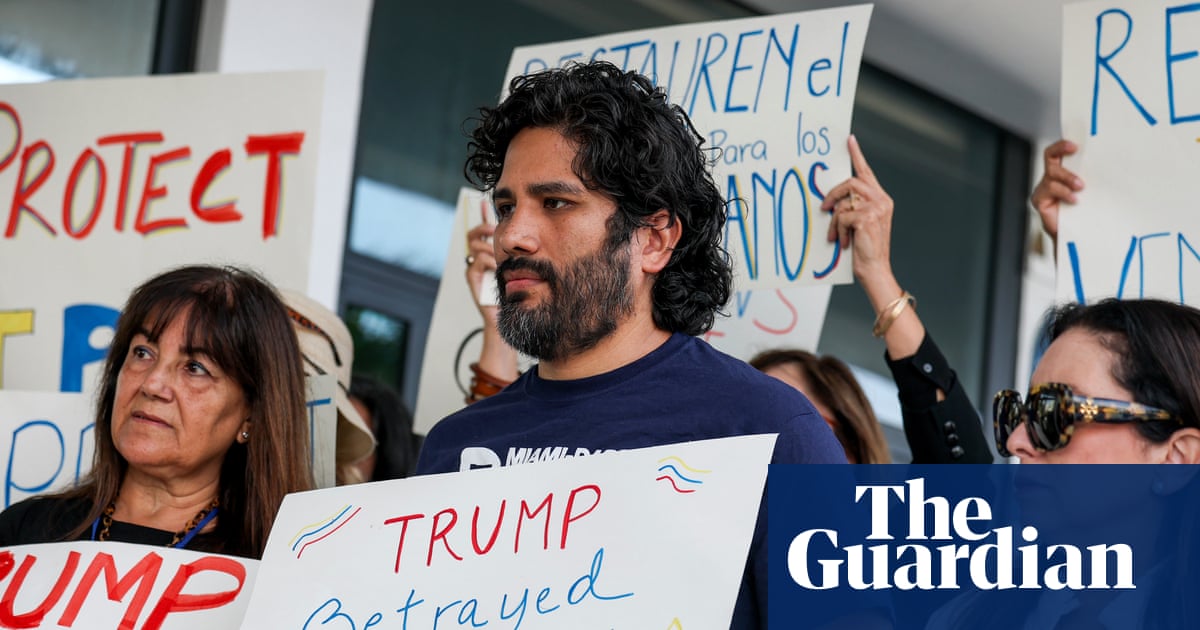






Comments